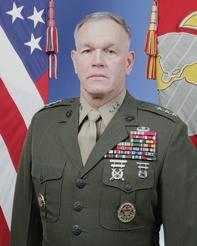
A speech Tuesday at the Donald P. Jacobs Center featured two rarities in the world of environmental activism: a conservative advocacy group and a military officer.
Former Marine Corps Lt. Gen. Richard Zilmer spoke to about 75 students from the Kellogg School of Management about the national security risks posed by oil dependency and climate change. Zilmer, who retired in 2011 after 36 years of active duty, serves on the research nonprofit CNA’s Military Advisory Board, a group of retired military officers working on issues of national security. CNA is a not-for-profit research and analysis organization.
Zilmer wove stories from his time in the military into his half-hour long talk, including a “twilight zone” midday journey from Saudi Arabia into Kuwait during Operation Desert Storm in 1991, during which he realized the importance of oil in American foreign policy.
“It struck me,” Zilmer said. “You couldn’t escape the reflection that part of the reason we were there was ensuring that lines of communication, petroleum fuel, petroleum, remained open because this is how our global economy works.”
He emphasized during the speech how the board was providing military experience to a field normally dominated by science and economics, while reiterating the importance of a multifaceted approach where nobody has a monopoly on the best ideas.
“There’s a sweet spot between the Department of Energy and the Department of Defense that we’re trying to find right now,” he said. “Anything that’s promoting efficiency and reducing that impact of petroleum, we get behind.”
Zilmer came to Kellogg through the board’s partnership with Young Conservatives for Energy Reform. Brian Smith, the Midwest director and a co-founder of the group, said the group’s broader goal in partnering with the Military Advisory Board is to “inform grassroots conservatives about the risks posed by climate change and oil dependency.” Smith, though, said he hoped Zilmer appealed to an audience of young professionals with a wide scope of political views, while demonstrating the importance of linking the military and business worlds.
“The military continues to talk to the business community and the political community about the security risks that this poses,” the first-year Kellogg student said. “It’s about finding the right balance between economic security and national security.”
Zilmer also offered a call-to-arms to the business school students in front of him, noting the country is “sitting at a crossroads with climate change,” which will shape “the future you’re going to inherit.” Near the end of his speech, he returned to economics.
“If the price of gas drops 50 cents tomorrow, people like us won’t be invited to talk anymore.”
Rubab Bhangu Mavi, a first-year Kellogg student, said Zilmer was “preaching to the choir” because she has worked on environmental policy before, but she said it was good to see the military paying attention to the environment.
“I’m glad the military is getting behind everyone and educating them on the need to get this to happen because I think the U.S. really cares about what the Army thinks and the Air Force thinks,” she said.
Zilmer’s talk was preceded by words from several other speakers, including Christian Burgsmueller, head of the Transport, Energy, Environment and Nuclear Matters section of the European Union’s Washington Delegation. Burgsmueller had some veiled critiques of America’s handling of energy policy, referencing “your fossil fuel bonanza” and the persistence of climate change dissenters.
“In Europe, this is settled science,” Burgsmueller said. “There’s no debate raging in Europe on climate change.”
Still, he noted “the trans-Atlantic flavor of the whole story,” explaining that Europe was once as dependent on Russia for its oil as the United States is on the Middle East before a push for clean energy in the last two decades.
Zilmer was firm in his concern that America needed to improve its energy policy — and quickly.
“The rest of the world has gotten it,” he said. “If we’re not smart, we’re going to find ourselves behind … in the future.”


















